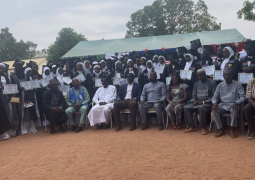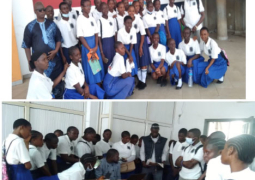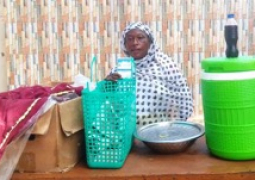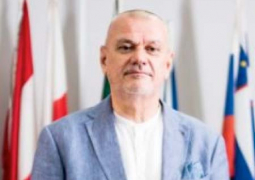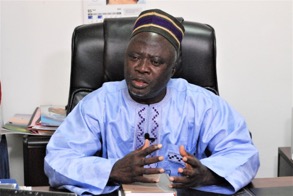
On April 21, 2023, during a visit by Banjul Muslim Elders, marking the Edul Fitr locally known as Koriteh celebration, President Adama Barrow had spoken against some community radio stations, saying they needed to be regulated as they give platform to people who “attack” his government. Days after his speech, the Public Utilities and Regulatory Authority (PURA) sent letters to King FM, Sayda 1 FM and Home Digital FM seeking explanation about certain programmes.
Recall
In the first republic, The Gambia was known for its respect for the rule of law, human rights and the promotion of media freedom and independence. However, that chapter was turned when the junta members illegally took power through a coup led by ex-dictator Yahya Jammeh in 1994.
During the 22 years of Jammeh's rule as president, many Gambians including journalists had been reported missing or killed by the orders of Jammeh, who then used his notorious killers called ‘Junglers’ to suppress the media in order to entrench himself in power.
One of the journalists killed through the orders of Jammeh is the Co-Founder of this medium, Dayda Hydara. During Jammeh’s 22 years in power, many fled in fear of murder and The Gambia was always named at the bottom, within the last three in the World Press Freedom ranking.
In 2016, Gambians happily changed that dictatorial regime through the ballot box using marbles. Since 2017 to date, there has been an increase in the number of registered and non-registered media houses. The Gambia government avails journalists the opportunity to freely carry out their work until recently when the President made a remark targeting journalists by looking into some community Radio Stations he believes give airtime to people who attack his government’s agenda.
Freedom of expression is a fundamental human right and the new UNESCO analysis of V-Dem data in 180 countries indicates a strong correlation between Freedom of Expression and the health of other human rights.
The UNESCO analysis shows that the countries with the highest levels of freedom of expression also enjoy a significant higher level of protection of civil, political, economic and social rights, such as access to justice, a near absence of political killings and very low levels of exclusion across gender, socio-economic, urban-rural, political and social group indicators.
Information Minister’s view
Dwelling on the president’s pronouncement, Lamin Queen Jammeh, the minister of Information, in an interview, explained that the president could have said that as a matter of concern. He added that it is his responsibility and right to bring corrections of any malpractice or mis-happenings in the country.
“Sometimes it’s the democratic nature of the president; otherwise there are certain things that community radios are doing that are not provided for in the content of their licence,” the minister said. “We sometimes bring it to the attention of PURA and the president appreciates that democratization sometimes has to go with these challenges. The radios know the content of their licence and the limitation but are very commonly flouting those contents.”
He said the law that gives birth to their existence has also put in place a mechanism for control and regulation. He continued that PURA might have not been aware of certain things, adding that if it comes to the observation of the president as a concerned leader, it can be a wake-up call for PURA and any actor.
“If anybody thinks that anytime PURA acts is from the government, is a gross mistake and is biased judgment because everybody knows that PURA has been put up as an independent regulatory body,” he stated, saying: “PURA is operating within their mandate should they write to radio stations for any regulatory matter.”
On media freedom in the country, the minister stated that it can be explained essentially by the democratic climate that is available in the country, while reiterating that without being told, it is seen and felt everywhere. He went on that the democratic process in The Gambia is ongoing at a speed appreciated by any reasonable thinking person and this could not have been done without the will of the political leadership.
“The political space is already created for media performance in my view but very often, we, from the angle of administration in government, see a lot of media houses being very biased,” he said further. “There is a programme that many radio stations have adopted, which is the translation of newspapers into the local languages. The bias is easily felt.”
Reaction of the GPU
Mamodou S. Bah, the president of the Gambia Press Union (GPU), describes the President’s pronouncement as “unfortunate”, saying if such information comes from a leader who should ensure democracy and its values flourish in the country, then it’s a problem. He said the president should ensure that the momentum of press freedom continues.
“We have addressed PURA’s warning letter and I think PURA will not make such kind of attempts or use such approaches,” Bah affirms. “We encourage PURA to use the Media Council in terms of regulating ethics.”
He told this medium that the GPU has recorded 15 assault cases since the inception of Barrow’s government, emphasizing that the cases have been mainly perpetrated by political party supporters including party leaders and security personnel. He said none of the cases have been investigated and no perpetrator has been brought to book.
He made an assessment of the current press freedom in the country and stated: “Press freedom is good compared to the previous regime and I believe this will continue and hope to have reforms in the existing draconian laws and the implementation of the Access to Information Act.”
Reaction from affected radio stations:
Baboucar Ceesay, the manager of King FM Radio, told this medium that the letter sent to them from PURA is against press freedom, saying it’s a threat to media houses. Mr Ceesay doesn’t expect Gambia to go into another level of such situations and stated: “We had witnessed what happened in the past and thought we were out of that era. We don’t want what happened in the past to repeat.”
He tells the government to respect journalists thus emphasizing that journalists only do their work as expected. He said the sitting government won’t like people criticizing them, noting that before they assumed power, they were supporting people who speak the truth. He calls on President Barrow’s government to accept the truth and not to see journalists as their enemies.
Reacting to the letter, Lamin Manneh, deputy director of Fayda 1 FM - the only radio station owned by a person with disability in the country, told this medium that the letter called the attention of some of their presenters on the manner they conducted their programmes. He confirmed responding to the letter and was subsequently invited to PURA.
“What they told us and what happened was a different story. This is the way Jammeh started by suppressing the media until he was able to control the media,” he noted, saying: “The government, including PURA should not try to suppress the media. Jammeh did it and we condemned it and in a democratic government like Barrow’s, we don’t expect as such.”
Mr Manneh noted that there should be freedom of speech, association and movement while reiterating that if the government tries to use PURA to suppress the media, they would not accept it.
“The letter is totally against media freedom because the media should be allowed to freely share information,” he affirms. “We have the right to go on air and inform our listeners about the day-to-day running of our government. Let the government try to leave a legacy that the citizens will be proud of.”
He also said it was a disgrace that the Ministry of Information denied any knowledge of the letter sent by PURA.
Pa Modou Bojang, chief executive officer of Home Digital FM, told this medium that the president’s statement came amid allegations that because of King FM and Home Digital FM, his party was not able to win in Kanifing Municipality and West Coast Region during the councillorship elections.
Mr Bojang explained: “They said the reason is that we always criticize the government, which is not the case. My ‘Mengbeh Karing’ Show looks at what happens on a daily basis and affects the lives and livelihood of Gambians. This show is the problem of the government because people do call to express their voices, frustrations and experiences.”
According to Bojang, the letter sent by PURA referred to an incident of 19 November 2022, in which he stated that “fake monies entered the Central Bank with impunity and some farmers in Badibou were paid fake monies with impunity” (sic). He added that he was asked to write and explain why an action shouldn’t be taken against his radio.
“If PURA realises that what we (journalists) said is not true, I think the Central Bank should be in a better position to challenge us because they have the right to reply. If we say something about government or public institutions, the content is not up to the regulators, but the institution we alleged.”
Expert’s view:
We have engaged Dr Sulayman Bokar Bah, who holds PhD in Media Law and Journalism in Post-Colonial Africa; LLM – Master of Laws International Human Rights Law; PGCert – Postgraduate Certificate in Research Practice; and BA Hons in Media and Communication (Journalism).
Dwelling on the President’s comment against the media and PURA’s reaction, the media expert viewed the President`s comments as a reflection of a suspicious and hazardous relationship that exists between the authorities and the private media. With the extreme version of freedom of expression in a new democracy, he said, authorities are getting extremely concerned about the professional standards of broadcast journalism in The Gambia.
“Even though PURA is responsible for regulating the broadcast media, their intervention shortly after the President`s pronouncements could be seen as politically motivated,” he stated. “This assumption could be true; especially PURA is a government agency. As a keen observer of what is happening in the Gambian media, particularly within the radio industry, the President might have genuine concerns because the media must also be accountable to society.”
He further emphasised that laws exist everywhere to check the excesses of journalists or news media organisations, saying these include laws bordering on libel, respect for privacy, national security and so on.
On what needs to be done to avoid a repetition of the past, he said the government has the sole responsibility to protect and promote freedom of expression. In this regard, he explained that the government should consult the Gambia Press Union and other stakeholders such as the National Human Rights Commission to review past and existing threats against the safety of journalists in The Gambia, both online and offline.
“This way, there can be clear measures endorsed by the authorities and the Gambia Press Union to promote the safety of journalists. Although some of the threats under Jammeh are no longer the case, there are new forms of threats including mob censorship both online and offline.”
Dr Bah continued that journalists must strive to operate to certain ethical standards including truthfulness, doing no harm, and generally serving the public interest.
As part of the licencing requirements for private media houses to link with the state radio during news hours, the expert explained that this mainly exists under authoritarian settings, where the state controls editorial and programming content to merge private stations into national broadcasters.
“This is an outdated system of control and unsuitable in a democracy. It is an affront to independent journalism and the rule must be amended.”
He concluded that media freedom is gradually thriving in The Gambia while reiterating that journalism in The Gambia is now faced with professional challenges. These challenges, he said, include accuracy and fairness, respect for individual privacy, ethnic incitements, inciting violence, and copyright issues.
Several efforts were made to engage the Director General of PURA, Yusupha M. Jobe, but they proved futile.


